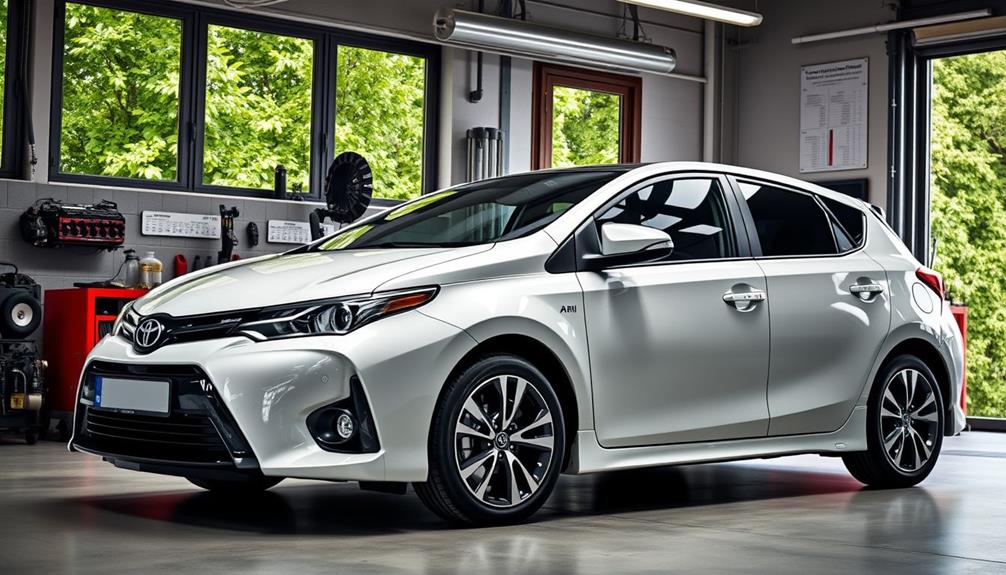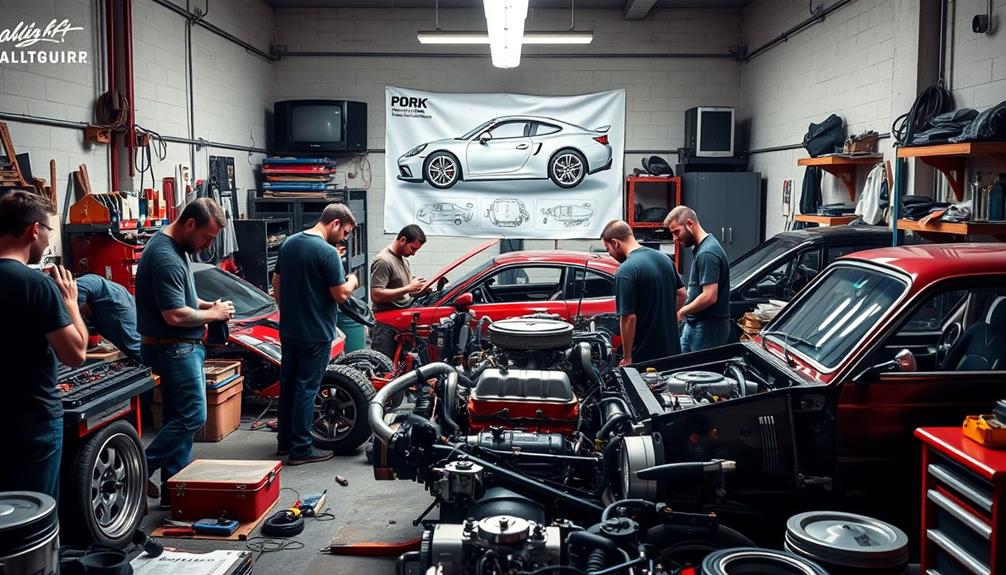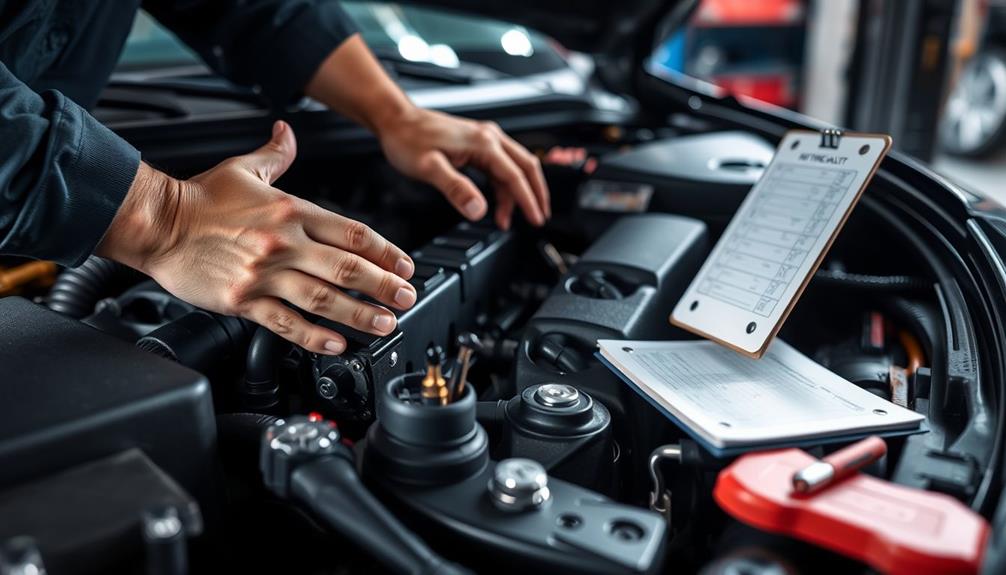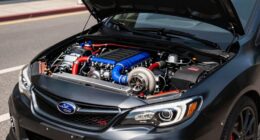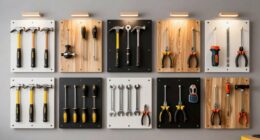A typical car tune-up takes between 1 to 4 hours, depending on your vehicle's model and its condition. During your service, a technician will inspect and possibly replace critical components like spark plugs, air filters, and fuel filters. You might notice improvements in fuel efficiency and engine performance afterward. If the check engine light is on or you're experiencing rough idling, these could be signs you need a tune-up. Regular maintenance can help prevent more severe issues down the road. Want to know more about the benefits and costs associated with tune-ups? Schedule your next car tuneup time with our certified technicians to ensure your vehicle is running smoothly and efficiently. By staying on top of regular maintenance, you can avoid unexpected breakdowns and costly repairs. Contact us today to discuss the best options for keeping your car in top shape.
Key Takeaways
- A typical tune-up takes between 1 to 4 hours, depending on the vehicle model and complexity of the service.
- Technicians inspect key components such as spark plugs, air filters, and fuel filters during the tune-up process.
- Regular maintenance can reduce service time and ensure optimal vehicle performance with fewer underlying issues.
- Signs indicating a needed tune-up include decreased fuel efficiency, engine misfires, or the check engine light activation.
- Scheduling during non-peak times can minimize wait times and ensure efficient service delivery.
What Is a Tune-Up?
When it comes to keeping your car in top shape, a tune-up is an essential maintenance service you shouldn't overlook. A tune-up involves inspecting and replacing key components to guarantee your vehicle runs efficiently. This service focuses primarily on the engine, enhancing its performance and extending its lifespan.
During a tune-up, mechanics typically check several components, including spark plugs, air filters, fuel filters, and ignition systems. By replacing worn-out spark plugs, you can notably improve fuel economy and reduce harmful emissions. Ignoring routine maintenance like this can lead to more serious issues down the line.
Most vehicle manufacturers recommend a tune-up every 30,000 to 100,000 miles, although this can vary based on your specific model. The cost for this service usually ranges from $50 to $150, but it can go higher for specialized services.
Investing in regular tune-ups not only helps your engine run smoothly but also helps identify potential problems early on. By staying proactive with maintenance, you'll enjoy better vehicle performance and save money in the long run.
Duration of a Tune-Up

A typical car tune-up usually takes between 1 to 4 hours, depending on your vehicle's model and maintenance history.
Modern vehicles, equipped with advanced technology, typically require less time for an engine tune-up than older vehicles, which might've more mechanical parts. If you drive an older vehicle, expect the duration to be on the longer side, as wear and tear may lead to additional inspections and repairs.
The complexity of the service can also impact the time needed for a tune-up. If your car has underlying issues that need addressing, that can extend the duration of your visit.
To minimize downtime, it's a good idea to keep a regular tune-up schedule and address any routine maintenance promptly.
When you arrive for your appointment, the technician will assess your vehicle's specific needs and provide a more accurate estimate based on its condition.
Preparing for a typical tune-up in advance can help facilitate a quicker service completion, allowing you to get back on the road sooner.
Key Components Inspected

During your tune-up, the mechanic will check the condition of your spark plugs and replace them if necessary.
They'll also inspect your air and fuel filters to guarantee your engine gets the airflow and fuel it needs for peak performance.
Keeping these components in top shape is essential for maintaining your car's efficiency and reliability.
Spark Plug Condition
Spark plugs play an important role in your engine's performance, as they ignite the air-fuel mixture necessary for combustion. During a tune-up service, technicians closely inspect the condition of your spark plugs to guarantee they're functioning at their best. Worn or damaged spark plugs can lead to weaker sparks, which might cause engine misfires and decreased fuel efficiency.
You should consider replacing your spark plugs every 30,000 to 40,000 miles to maintain peak engine performance. Signs of wear include carbon buildup, corrosion, or damaged electrodes. If your spark plugs show these issues, a replacement is vital to avoid further engine problems.
The good news is that replacing spark plugs typically takes under an hour, depending on your vehicle model and how accessible the plugs are. Using high-quality spark plugs, like platinum or iridium, can extend the replacement interval up to 160,000 kilometers, enhancing both engine longevity and performance.
Air and Fuel Filters
When it comes to your vehicle's performance, air and fuel filters are vital components that shouldn't be overlooked. The air filter guarantees proper airflow to the engine, while the fuel filter prevents contaminants from entering the fuel system. Regular maintenance of these filters is essential for peak engine performance.
Generally, you should replace the air filter every 15,000 to 30,000 miles and the fuel filter every 30,000 to 50,000 miles, following your manufacturer's guidelines.
During a tune-up, technicians will inspect both filters for dirt, damage, or blockage. If they find any issues, they'll recommend replacement to maintain your vehicle's efficiency.
Clogged air and fuel filters can lead to reduced fuel efficiency, engine misfires, and decreased overall performance. By confirming that these filters are clean and functioning well, you enhance your engine's responsiveness and prolong your vehicle's lifespan.
Incorporating regular inspections and replacements into your maintenance routine will help prevent strain on your engine components and keep your car running smoothly.
Don't underestimate the significance of air and fuel filters during your next tune-up!
Signs You Need a Tune-Up
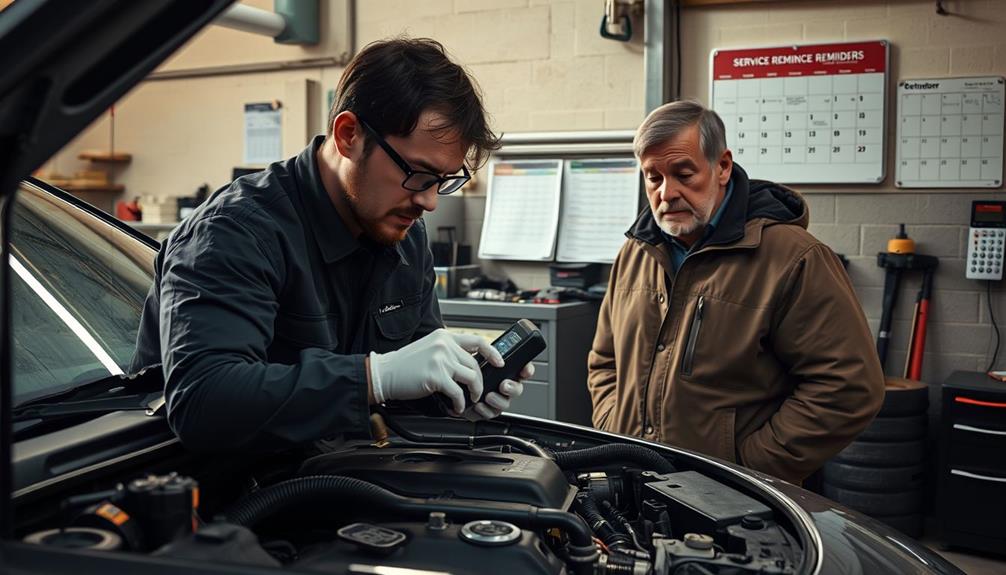
If you notice a drop in fuel efficiency, it's a sign that your engine mightn't be performing at its best.
Additionally, if your check engine light comes on, don't ignore it; that warning could lead to bigger issues down the road.
Paying attention to these signs can save you time and money by prompting a timely tune-up.
Decreased Fuel Efficiency
A noticeable drop in fuel efficiency can signal that your vehicle needs a tune-up. When you experience decreased fuel efficiency, it often points to underlying issues that affect your engine performance. Worn spark plugs and dirty air filters can greatly hinder how efficiently your engine burns fuel, leading to higher costs at the pump.
If you've noticed a notable drop in your fuel economy, it's important to take into account routine maintenance. This could include replacing filters and inspecting spark plugs, both vital for ideal engine function.
Regular tune-ups not only help maintain your vehicle's performance but can also enhance fuel economy, saving you money in the long run.
Keep an eye on your fuel consumption. If you spot consistent drops in mileage, it might be time for a tune-up. Addressing decreased fuel efficiency early can prevent more serious engine issues down the line.
Additionally, you might notice other signs, such as engine misfires or rough idling, that can be resolved during a tune-up service. Don't ignore these indicators; they're your vehicle's way of telling you it's time for some care.
Warning Light Indicators
Warning lights on your dashboard can be your vehicle's way of screaming for attention, especially the check engine light. When this light illuminates, it's a clear signal that your vehicle needs immediate maintenance. Ignoring it can lead to more costly repairs down the road, as it often indicates underlying issues in the engine or other critical systems.
Additionally, if you notice a decreased fuel efficiency warning light, it might mean components like spark plugs or air filters require inspection or replacement during a tune-up. Unusual noises from the engine, combined with these warning lights, can signify serious problems that need addressing promptly to maintain your vehicle's performance.
Regularly monitoring these warning lights guarantees you stay ahead of potential issues, preventing further deterioration and improving overall safety and reliability.
When you see any warning lights, don't hesitate to schedule a tune-up. By addressing these signals early, you can avoid more significant problems and keep your vehicle running smoothly for years to come.
Benefits of Regular Tune-Ups
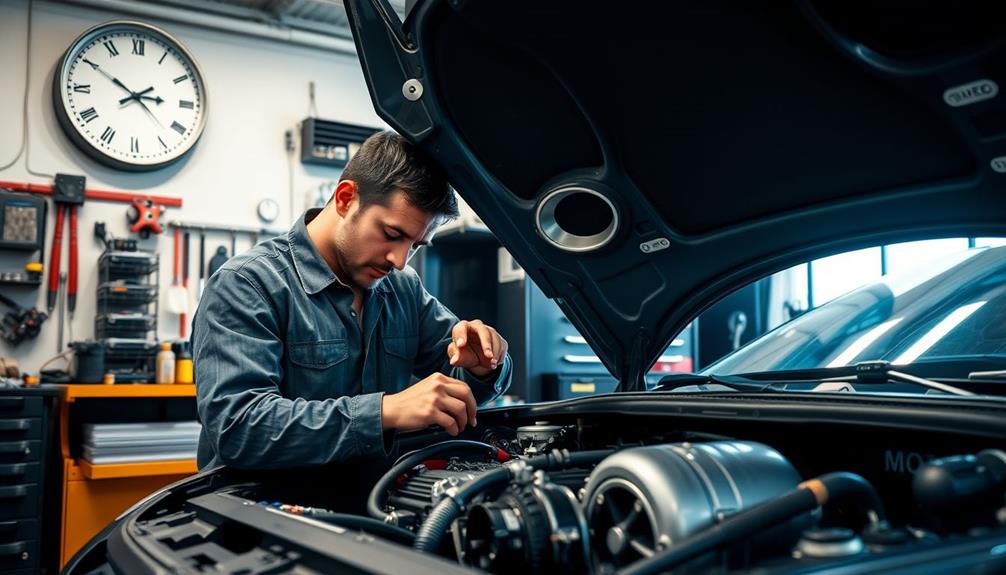
Enhancing your vehicle's performance through regular tune-ups offers a range of benefits that every car owner should consider. By scheduling these essential maintenance services, you not only boost your engine performance but also enjoy a smoother driving experience and improved acceleration.
Regular tune-ups can considerably enhance your fuel economy, which translates to noticeable savings at the gas pump, especially if you're a high-mileage driver. Additionally, maintaining your vehicle can help you avoid financial mistakes like overspending on repairs that arise from neglecting necessary upkeep.
Here are some key benefits of regular tune-ups:
- Improved engine performance for better responsiveness
- Enhanced fuel economy, saving you money on gas
- Reduced harmful emissions, contributing to a cleaner environment
- Increased vehicle lifespan through preventive maintenance
Moreover, these routine services allow you to identify and fix minor issues before they escalate into costly repairs. This proactive approach not only protects your wallet but also guarantees your vehicle remains reliable for years to come.
Cost of Tune-Up Services

When it comes to the cost of tune-up services, you might find a wide range of prices based on your vehicle's needs and the specific services performed. A basic tune-up usually costs between $50 and $150, while specialized services for more complex vehicles can range from $200 to $800.
Labour costs for tune-ups typically range from $105 to $175 per hour, and most basic tune-ups require about 1.5 hours of labour. Additionally, parts for a typical tune-up, like spark plugs, can cost anywhere from $5 to $15 each, leading to a total parts cost of approximately $15 to $120 for 4-8 plugs. Don't forget that additional services, such as oil changes or filter replacements, may incur extra charges, further increasing your total expense.
Here's a quick breakdown of potential costs:
| Service Type | Cost Range | Notes |
|---|---|---|
| Basic Tune-Up | $50 – $150 | Standard checks and replacements |
| Specialized Tune-Up | $200 – $800 | Complex vehicle needs |
| Labour Costs | $105 – $175/hour | Typically 1.5 hours |
| Parts (Spark Plugs) | $15 – $120 | For 4-8 plugs |
| Additional Services | Varies | Fluid changes, filters, etc. |
Being informed helps you budget effectively for your tune-up.
Scheduling Your Tune-Up
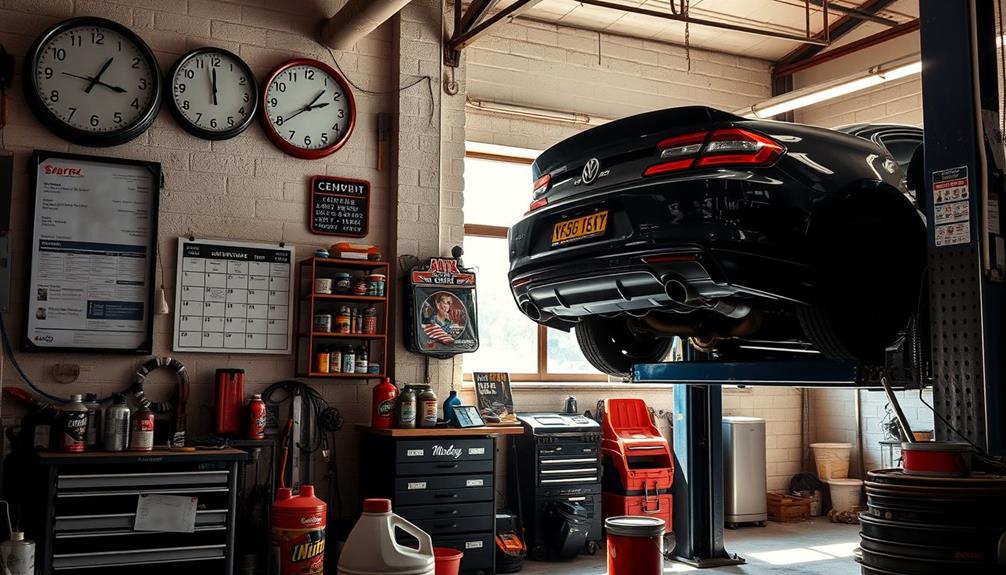
Planning your tune-up in advance can save you time and hassle, especially during busy maintenance seasons. By scheduling your service ahead of time, you can greatly reduce wait times and guarantee quicker service.
Typically, a tune-up takes between 1 to 4 hours, depending on your vehicle model and the extent of maintenance required.
To make the most of your tune-up, consider these tips:
- Check your vehicle owner's manual for specific recommendations on the frequency and type of tune-up needed.
- Schedule your service during non-peak times to avoid long waits.
- Early detection of potential issues can prevent more extensive repairs down the line.
- Maintain a regular service schedule for better vehicle performance and longevity.
Current Service Specials
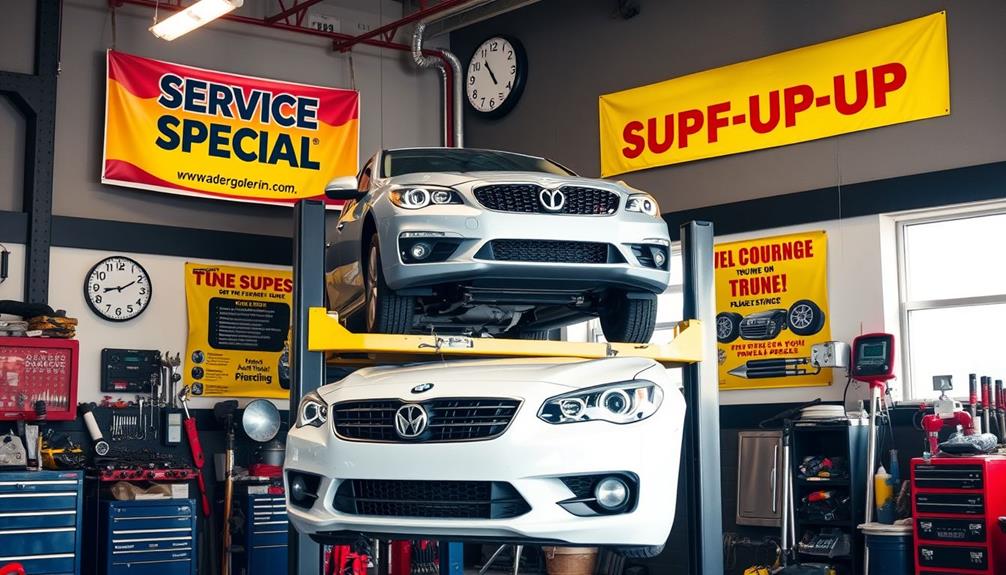
Taking advantage of current service specials can greatly reduce your maintenance costs while keeping your vehicle in prime condition.
At Toyota of Cedar Park, you can benefit from an oil change service that covers up to 5 quarts of oil, valid until December 31, 2024. This is an essential part of car maintenance, especially for older cars that require more frequent attention. It's similar to how a Gold IRA can provide a hedge against inflation, guaranteeing your investments remain robust over time.
If you're looking to improve air quality in your vehicle, don't miss the 10% discount on the purchase of both a cabin air filter and an air filter, available exclusively for Toyota models.
Additionally, if your battery needs servicing, you can get the Toyota TRUE START battery installed starting at $159.95, which includes cleaning.
Front wiper blade assemblies can also be replaced with a 15% discount when you choose the Sightline Wiper Blades service.
Finally, verify your tires perform at their best by taking advantage of the tire rotation and balance service, also available until December 31, 2024.
These service specials not only save you money but help keep your vehicle running smoothly for the long haul. Don't miss out!
Choosing a Repair Shop
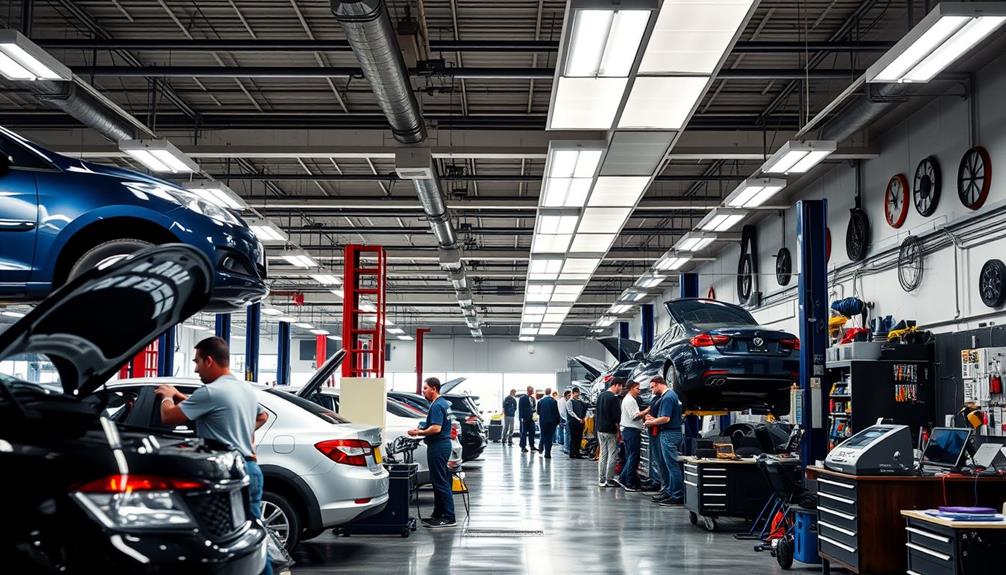
Finding the right repair shop for your vehicle can make all the difference in maintaining its performance and longevity. A reputable shop not only guarantees quality service but also gives you peace of mind during your tune-up.
Start by researching local repair shops to find those with strong customer reviews and ratings. This will help you gauge their reliability and service quality. Additionally, consider asking for recommendations from friends or family who've had positive experiences, as personal referrals can often lead to trustworthy options.
For further guidance, you may want to check out cold medications overview that discuss the importance of selecting the right services.
Consider these key factors when choosing a repair shop:
- Specialization: Look for shops that specialize in your vehicle's make for better service and expertise.
- Certifications: Verify technicians have the necessary certifications and qualifications to perform the required services.
- Estimates: Always ask for estimates before work begins, and inquire about any additional fees to avoid surprises.
- Warranties: Seek out shops that offer warranties on their services and parts, providing added reassurance about the work done.
Frequently Asked Questions
How Long Does a Car Tune-Up Take?
A car tune-up usually takes between 1 to 4 hours, depending on your vehicle's model and condition. Scheduling in advance and keeping up with maintenance can help you get quicker, more efficient service.
What Does a Full Tune-Up Include?
Did you know spark plugs should be replaced every 30,000 to 40,000 miles? A full tune-up includes changing those plugs, inspecting filters, checking the ignition system, and evaluating belts and hoses for peak performance.
What Is the Average Cost of a Full Tune-Up?
The average cost of a full tune-up usually ranges from $50 to $150 for basic services. For specialized work, expect to pay between $200 to $800 depending on your vehicle's complexity and required services.
How Long Does a Car Tuning Take?
Your car's purring engine contrasts with the clunky sounds of an overdue tune-up. Depending on its age and care, you'll find a tune-up takes anywhere from 1 to 4 hours, sometimes longer for unexpected issues.
Conclusion
In the grand symphony of car maintenance, a tune-up is your vehicle's chance to hit all the right notes. By knowing what to expect and recognizing the signs that it's time for one, you keep your ride performing at its best. Regular tune-ups not only enhance your car's longevity but also save you money in the long run. So, don't wait for trouble to strike; schedule your tune-up today and enjoy the smooth drive ahead!

